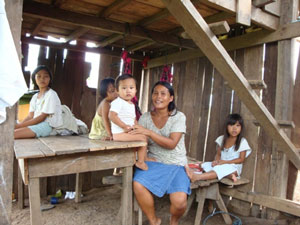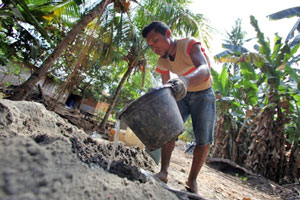East Asia is a diverse and dynamic region that is increasingly driving global growth, investments, skills and knowledge, while at the same time facing emerging development challenges. Among the most pressing of these are climate change, infrastructure, gender equality, governance and poverty. Australia and the World Bank are focusing on helping countries take advantage of opportunities to promote development and address these core challenges.
Cooperation in the East Asia region makes up approximately 30 per cent of the overall partnership. In 2011–12, Australia provided $176 million to the World Bank for joint efforts to support the region as a whole, as well as country-specific work in Cambodia, Indonesia, Laos, Mongolia, the Philippines and Vietnam.
In February 2012, Australia and the World Bank announced a new four-year $58 million partnership in Vietnam. The partnership will focus on improving key infrastructure, addressing climate change impacts, strengthening resilience to natural disasters, improving service delivery to vulnerable and rural communities, and supporting green growth. It will also aim to strengthen financial and private sector development and support key economic reforms.
The Australia – World Bank Group partnership is improving people's lives in East Asia:
- Since 2008, improved access to running water and sanitation has benefited more than 5 million Indonesians [external website].
- Since 2006, more than a million households in the Philippines have benefited from community-led-projects such as new school buildings, improved water facilities and critical infrastructure.
- Since 1998, 100,000 kilometres of roads, more than 17,000 bridges, 17,000 health posts and 28,000 schools have been built or renovated in Indonesian communities.
- More than 20,000 vulnerable Indonesian women have benefited from empowerment activities like literacy and numeracy training.
- In 2011, more than one thousand Lao school principals were trained in leadership and a 'Schools of Quality approach' and one hundred Lao pre-primary teachers received pre-primary training.
Securing land for families, homes and businesses in the Philippines
The World Bank and Australia are working closely together to provide much-needed security to families and business owners in the Philippines by helping them secure ownership of land. Photo: Dave Llorito, World Bank
With ownership papers, landholders are more secure. This is a simple statement, but one that has big implications for families and communities in the Philippines, where land titling used to be a complicated and expensive process, discouraging many landowners from registering their lands. Having a title deed not only secures family homes and businesses: the secure title itself immediately increases the value of the land and allows owners to use it as collateral for a loan. This paves the way for greater investment and economic growth.
The World Bank and Australia are helping the Philippines Government to simplify the land registration process and improve land titling. By 2011, more than 109,000 titles had been provided under the joint project and processing time had been reduced. In the first municipality where the project was implemented, around 85 per cent of land is now under title–providing much-needed security to families and business owners.
Thousands of roads, bridges, schools and health posts developed in Indonesia
The National Program for Community Empowerment in Indonesia employs local villagers on its projects, providing an important income stream for communities. Photo: Josh Estey, AusAID
One of Indonesia's best known and most successful community-driven poverty reduction programs, the National Program for Community Empowerment [video, external website], is supported by the World Bank and Australia. It gives power to communities by placing funds, planning and decision making directly in the hands of villagers. This Government of Indonesia initiative provides funds directly to village collectives, allowing villagers to use these grants to build infrastructure, give loans to existing groups for working capital, or make social investments in education and health.
To date the program has supported more than 60,000 villages and resulted in the creation of more than 100,000 kilometres of roads, more than 17,000 bridges and more than 20,000 sanitation units. In addition, 28,000 schools and 17,000 health posts have been built or renovated. These changes have created improved access to markets, town centres, health and education facilities, transport, business opportunities and clean water supplies in every rural village in the country.


